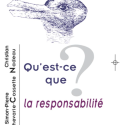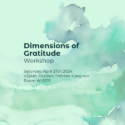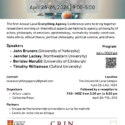Aucun événement à venir
Événements passés
 28 Mar 2025 - Abraham Roth (Ohio State University)
28 Mar 2025 - Abraham Roth (Ohio State University) 14 Fév 2025 - Lancement de Qu’est-ce que la responsabilité?
14 Fév 2025 - Lancement de Qu’est-ce que la responsabilité? 9 Avr 2025 - Eugene Chislenko (Temple University)
9 Avr 2025 - Eugene Chislenko (Temple University) 10 Oct 2024 - The Montreal Workshop on Emotions and Normativity
10 Oct 2024 - The Montreal Workshop on Emotions and Normativity 6 Mai 2024 - Colloque des boursiers et boursières du GRIN
6 Mai 2024 - Colloque des boursiers et boursières du GRIN 15 Mai 2024 - Richard Healey (LSE)
15 Mai 2024 - Richard Healey (LSE) 27 Avr 2024 - Dimensions of Gratitude Workshop
27 Avr 2024 - Dimensions of Gratitude Workshop 31 Oct 2023 - Jens Gillessen (Philipps-Universität Marburg, Allemagne)
31 Oct 2023 - Jens Gillessen (Philipps-Universität Marburg, Allemagne) 26 Sep 2023 - « Forgiving Debts of Gratitude »
26 Sep 2023 - « Forgiving Debts of Gratitude » 22 Sep 2023 - Wlodek Rabinowicz (Lund University)
22 Sep 2023 - Wlodek Rabinowicz (Lund University) 16 Sep 2023 - Logic, Meaning, and Knowledge
16 Sep 2023 - Logic, Meaning, and Knowledge 10 Nov 2023 - Carolyn McLeod (Western University)
10 Nov 2023 - Carolyn McLeod (Western University) 27 Mar 2024 - Tom Angier (U. of Cape Town)
27 Mar 2024 - Tom Angier (U. of Cape Town) 25 Avr 2024 - Premier colloque annuel sur l’Agentivité dans tous ses états, à l’Université Laval
25 Avr 2024 - Premier colloque annuel sur l’Agentivité dans tous ses états, à l’Université Laval 16 Juin 2023 - Choosing Well: The Good, the Bad, and the Trivial (OUP 2023), by Chrisoula Andreou
16 Juin 2023 - Choosing Well: The Good, the Bad, and the Trivial (OUP 2023), by Chrisoula Andreou 21 Mar 2023 - « The Unity of Gratitude »
21 Mar 2023 - « The Unity of Gratitude » 31 Mar 2023 - Garret Cullity (Australian National University)
31 Mar 2023 - Garret Cullity (Australian National University) 25 Mai 2023 - « Conceptualizing Addiction as an Orientation to the World »
25 Mai 2023 - « Conceptualizing Addiction as an Orientation to the World » 21 Avr 2023 - « Affective injustice: coping in a non-ideal world »
21 Avr 2023 - « Affective injustice: coping in a non-ideal world » 12 Oct 2022 - « Moral Worth, Skill, and Virtue »
12 Oct 2022 - « Moral Worth, Skill, and Virtue » 16 Mai 2022 - Antoine Panaïoti (Toronto Metropolitan University)
16 Mai 2022 - Antoine Panaïoti (Toronto Metropolitan University) 15 Juin 2022 - Chrisoula Andreou (Philosophy, U. of Utah)
15 Juin 2022 - Chrisoula Andreou (Philosophy, U. of Utah) 25 Mar 2022 - Jack Kwong (Appalachian State University)
25 Mar 2022 - Jack Kwong (Appalachian State University) 24 Mar 2022 - « The Value of Agency »
24 Mar 2022 - « The Value of Agency » 1 Juin 2022 - « Contextualizing Agency and Self-Control in Addiction »
1 Juin 2022 - « Contextualizing Agency and Self-Control in Addiction » 29 Mar 2022 - « Outline of a Philosophical Theory of Coping »
29 Mar 2022 - « Outline of a Philosophical Theory of Coping » 1 Nov 2021 - « Sustainability as Intergenerational Sharing »
1 Nov 2021 - « Sustainability as Intergenerational Sharing » 28 Avr 2021 - ANNULÉ! A Place for Coping in Action Theory
28 Avr 2021 - ANNULÉ! A Place for Coping in Action Theory 14 Mai 2021 - Fittingness conference
14 Mai 2021 - Fittingness conference 10 Déc 2020 - Neuroesthétique et la Science de la Creativité / Scientific Café Neuroaesthetics and the Science of Creativity
10 Déc 2020 - Neuroesthétique et la Science de la Creativité / Scientific Café Neuroaesthetics and the Science of Creativity 14 Avr 2021 - « Cooperativeness »
14 Avr 2021 - « Cooperativeness » 19 Oct 2020 - Les 7èmes Journées de métaéthique
19 Oct 2020 - Les 7èmes Journées de métaéthique 20 Avr 2020 - Théorie de l’erreur et utilitarisme
20 Avr 2020 - Théorie de l’erreur et utilitarisme 31 Mar 2020 - REPORTÉ! L’erreur morale
31 Mar 2020 - REPORTÉ! L’erreur morale 13 Fév 2020 - Jesse Prinz & Sarah Arnaud (CUNY)
13 Fév 2020 - Jesse Prinz & Sarah Arnaud (CUNY) 10 Jan 2020 - Kate Nolfi (Vermont)
10 Jan 2020 - Kate Nolfi (Vermont) 22 Nov 2019 - Being a believer by David Hunter (Ryerson)
22 Nov 2019 - Being a believer by David Hunter (Ryerson) 14 Nov 2019 - Knowledge in a Digital World: Epistemic Injustice, Bias, and other Challenges in the Age of Artificial Intelligence
14 Nov 2019 - Knowledge in a Digital World: Epistemic Injustice, Bias, and other Challenges in the Age of Artificial Intelligence 17 Oct 2019 - « Moral Psychology and Non-cognitivism: Hume against the Humeans”
17 Oct 2019 - « Moral Psychology and Non-cognitivism: Hume against the Humeans” 19 Nov 2019 - “Epistemic Duty and Epistemic Tension: a Rossian Account”
19 Nov 2019 - “Epistemic Duty and Epistemic Tension: a Rossian Account” 12 Avr 2019 - Well-Being: Subjective, Objective, Both, or Neither?
12 Avr 2019 - Well-Being: Subjective, Objective, Both, or Neither? 25 Mar 2019 - Qui peut sauver la morale ? Essai de métaéthique
25 Mar 2019 - Qui peut sauver la morale ? Essai de métaéthique 9 Avr 2019 - Caroline T. Arruda (University of Texas)
9 Avr 2019 - Caroline T. Arruda (University of Texas) 19 Mar 2019 - « Natural Injustice: Justice, Agency and Responsibility »
19 Mar 2019 - « Natural Injustice: Justice, Agency and Responsibility » 5 Avr 2019 - Lisa Tessman (Binghamton University)
5 Avr 2019 - Lisa Tessman (Binghamton University) 8 Mar 2019 - Recherches récentes en philosophie analytique
8 Mar 2019 - Recherches récentes en philosophie analytique 18 Fév 2019 - « Happiness sweatshop »
18 Fév 2019 - « Happiness sweatshop » 1 Mar 2019 - Barry Maguire (Stanford University)
1 Mar 2019 - Barry Maguire (Stanford University) 15 Jan 2019 - What is moral understanding ?
15 Jan 2019 - What is moral understanding ? 15 Mai 2019 - Bien-être, bonheur et vie bonne / Wellbeing, Happiness, and the Good Life
15 Mai 2019 - Bien-être, bonheur et vie bonne / Wellbeing, Happiness, and the Good Life 10 Déc 2018 - Internet et éthique de la croyance : les dangers épistémiques de la personnalisation
10 Déc 2018 - Internet et éthique de la croyance : les dangers épistémiques de la personnalisation 7 Déc 2018 - Stephanie Leary (McGill)
7 Déc 2018 - Stephanie Leary (McGill) 11 Sep 2018 - « What is it to do nothing? »
11 Sep 2018 - « What is it to do nothing? » 19 Oct 2018 - Relational Autonomy in Fiction
19 Oct 2018 - Relational Autonomy in Fiction 12 Oct 2018 - Dana Nelkin (University of California, San Diego)
12 Oct 2018 - Dana Nelkin (University of California, San Diego) 21 Sep 2018 - Pamela Hieronymi (UCLA)
21 Sep 2018 - Pamela Hieronymi (UCLA) 23 Mai 2018 - « Agency and Outlaw Emotions »
23 Mai 2018 - « Agency and Outlaw Emotions » 10 Avr 2018 - « Is the market a morality-free zone? »
10 Avr 2018 - « Is the market a morality-free zone? » 15 Mar 2018 - Marjorie Rhodes (NYU)
15 Mar 2018 - Marjorie Rhodes (NYU) 1 Mar 2018 - « Is Measuring Wellbeing Impossible? »
1 Mar 2018 - « Is Measuring Wellbeing Impossible? » 6 Mar 2018 - « Mutual Recognition, Friendship, and the Moral Relationship »
6 Mar 2018 - « Mutual Recognition, Friendship, and the Moral Relationship » 19 Fév 2018 - « There are no intrinsic desires »
19 Fév 2018 - « There are no intrinsic desires » 13 Fév 2018 - « Two reasons to step into the Matrix »
13 Fév 2018 - « Two reasons to step into the Matrix » 30 Jan 2018 - « From Individual to Collective Consent: The Case of Indigenous Peoples and UNDRIP »
30 Jan 2018 - « From Individual to Collective Consent: The Case of Indigenous Peoples and UNDRIP » 4 Déc 2017 - Should Mark promote my wellbeing?
4 Déc 2017 - Should Mark promote my wellbeing? 3 Nov 2017 - Cheshire Calhoun (Arizona State University)
3 Nov 2017 - Cheshire Calhoun (Arizona State University) 7 Déc 2017 - “Measuring the badness of death: Semi-Epicurean analysis and its implications”
7 Déc 2017 - “Measuring the badness of death: Semi-Epicurean analysis and its implications” 23 Oct 2017 - « There Are No Intrinsic Desires »
23 Oct 2017 - « There Are No Intrinsic Desires » 24 Oct 2017 - Les animaux: leurs droits et nos obligations
24 Oct 2017 - Les animaux: leurs droits et nos obligations 2 Nov 2017 - Cheshire Calhoun (Arizona State University)
2 Nov 2017 - Cheshire Calhoun (Arizona State University) 10 Fév 2018 - Virtue and Moral Reasoning Under Oppressive Social Condition
10 Fév 2018 - Virtue and Moral Reasoning Under Oppressive Social Condition 2 Mai 2018 - « La métaéthique et ses implications normatives »
2 Mai 2018 - « La métaéthique et ses implications normatives » 20 Nov 2017 - Hichem Naar (Omaha)
20 Nov 2017 - Hichem Naar (Omaha) 2 Nov 2017 - Forum sur le développement socialement responsable de l’intelligence artificielle
2 Nov 2017 - Forum sur le développement socialement responsable de l’intelligence artificielle 26 Jan 2018 - Dale Dorsey (University of Kansas)
26 Jan 2018 - Dale Dorsey (University of Kansas) 20 Oct 2017 - Sigrún Svavarsdóttir (Tufts University)
20 Oct 2017 - Sigrún Svavarsdóttir (Tufts University) 16 Mar 2018 - Bonheur et états affectifs / Happiness and Affective States
16 Mar 2018 - Bonheur et états affectifs / Happiness and Affective States 17 Nov 2017 - Epistemic Agents: Norms, Control and Responsibility in the Theory of Knowledge
17 Nov 2017 - Epistemic Agents: Norms, Control and Responsibility in the Theory of Knowledge 9 Fév 2018 - Ralph Wedgwood (University of Southern California)
9 Fév 2018 - Ralph Wedgwood (University of Southern California) 12 Jan 2018 - Nomy Arpaly (Brown University)
12 Jan 2018 - Nomy Arpaly (Brown University) 7 Juin 2017 - « Consent, Directed Duties, and Mutual Recognition »
7 Juin 2017 - « Consent, Directed Duties, and Mutual Recognition » 1 Fév 2018 - Susan R. Wolf (University of North Carolina at Chapel Hill)
1 Fév 2018 - Susan R. Wolf (University of North Carolina at Chapel Hill) 15 Mai 2017 - Attitudes, Rationality, and Concepts
15 Mai 2017 - Attitudes, Rationality, and Concepts 26 Avr 2017 - Christopher Howard (University of Arizona)
26 Avr 2017 - Christopher Howard (University of Arizona) 19 Juin 2017 - Chrisoula Andreou (University of Utah)
19 Juin 2017 - Chrisoula Andreou (University of Utah) 17 Mar 2017 - Peter Railton (University of Michigan)
17 Mar 2017 - Peter Railton (University of Michigan) 17 Mar 2017 - Neil Levy (Macquarie University)
17 Mar 2017 - Neil Levy (Macquarie University) 11 Avr 2017 - Michele Palmira (University of Barcelona and LOGOS)
11 Avr 2017 - Michele Palmira (University of Barcelona and LOGOS) 21 Avr 2017 - Frédérique de Vignemont (Institut Jean Nicod)
21 Avr 2017 - Frédérique de Vignemont (Institut Jean Nicod) 16 Fév 2017 - Journée de métaéthique
16 Fév 2017 - Journée de métaéthique 3 Fév 2017 - Philosophie analytique V
3 Fév 2017 - Philosophie analytique V 2 Fév 2017 - To trust or not to trust?
2 Fév 2017 - To trust or not to trust? 16 Mar 2017 - L’Esprit et les valeurs / Mind and Value
16 Mar 2017 - L’Esprit et les valeurs / Mind and Value 21 Nov 2016 - Les enjeux moraux de la méfiance / The Moral Stakes of Distrust
21 Nov 2016 - Les enjeux moraux de la méfiance / The Moral Stakes of Distrust 14 Nov 2016 - « A Relational Theory of Consent »
14 Nov 2016 - « A Relational Theory of Consent » 7 Nov 2016 - Intelligibility and the Guise of the Good
7 Nov 2016 - Intelligibility and the Guise of the Good 23 Fév 2017 - Well-being, normativity and « good for »
23 Fév 2017 - Well-being, normativity and « good for » 3 Oct 2016 - The cautious requirements of rationality
3 Oct 2016 - The cautious requirements of rationality 9 Déc 2016 - Kieran Setiya (MIT)
9 Déc 2016 - Kieran Setiya (MIT) 16 Sep 2016 - Neil Sinhababu (National University of Singapore)
16 Sep 2016 - Neil Sinhababu (National University of Singapore) 10 Mar 2017 - Kyla Ebels-Duggan (Northwestern University)
10 Mar 2017 - Kyla Ebels-Duggan (Northwestern University) 24 Fév 2017 - Krister Bykvist (Université de Stockholm)
24 Fév 2017 - Krister Bykvist (Université de Stockholm) 11 Nov 2016 - Anne Meylan (University of Basel)
11 Nov 2016 - Anne Meylan (University of Basel) 10 Nov 2016 - Nouvelles Perspectives sur la Duperie De Soi/New Perspectives of Self-Deception
10 Nov 2016 - Nouvelles Perspectives sur la Duperie De Soi/New Perspectives of Self-Deception 29 Sep 2016 - Time and intentionality international conference
29 Sep 2016 - Time and intentionality international conference 25 Mai 2016 - Roundtable on Ralph Wedgwood’s forthcoming book « The Normativity of Rationality »
25 Mai 2016 - Roundtable on Ralph Wedgwood’s forthcoming book « The Normativity of Rationality » 8 Juin 2016 - Chrisoula Andreou (University of Utah)
8 Juin 2016 - Chrisoula Andreou (University of Utah) 7 Avr 2016 - Amandine Catala (UQAM)
7 Avr 2016 - Amandine Catala (UQAM) 8 Mar 2016 - Who Should Decide How Machines Make Morally Laden Decisions?
8 Mar 2016 - Who Should Decide How Machines Make Morally Laden Decisions? 16 Déc 2015 - A pragmatist outlook on the tension between ‘know how’ and ‘know that’ in ethics
16 Déc 2015 - A pragmatist outlook on the tension between ‘know how’ and ‘know that’ in ethics 24 Nov 2015 - Disagreement. An Opinionated Introduction
24 Nov 2015 - Disagreement. An Opinionated Introduction 14 Déc 2015 - Stephen Darwall (Yale University)
14 Déc 2015 - Stephen Darwall (Yale University) 18 Mar 2016 - Julia Markovits (MIT)
18 Mar 2016 - Julia Markovits (MIT) 8 Jan 2016 - Shaun Nichols (University of Arizona)
8 Jan 2016 - Shaun Nichols (University of Arizona) 11 Déc 2015 - Patrick Rysiew (University of Victoria)
11 Déc 2015 - Patrick Rysiew (University of Victoria) 20 Nov 2015 - Jason Bridges (University of Chicago)
20 Nov 2015 - Jason Bridges (University of Chicago) 13 Nov 2015 - David A. Hunter (Ryerson University)
13 Nov 2015 - David A. Hunter (Ryerson University) 25 Sep 2015 - Miriam McCormick (University of Richmond)
25 Sep 2015 - Miriam McCormick (University of Richmond) 20 Juin 2015 - Symposium : Perspectives analytiques en théorie des valeurs
20 Juin 2015 - Symposium : Perspectives analytiques en théorie des valeurs 26 Mai 2015 - « Speculation in applied ethics: some methodological considerations »
26 Mai 2015 - « Speculation in applied ethics: some methodological considerations » 31 Mar 2015 - Duties to Oneself: the Challenge from Society-Anchored Morality
31 Mar 2015 - Duties to Oneself: the Challenge from Society-Anchored Morality 9 Juin 2015 - Chrisoula Andreou (University of Utah)
9 Juin 2015 - Chrisoula Andreou (University of Utah) 30 Avr 2015 - Normativité et métaéthique
30 Avr 2015 - Normativité et métaéthique 10 Mar 2015 - « Environmental Stewardship and the Values of Nature »
10 Mar 2015 - « Environmental Stewardship and the Values of Nature » 9 Déc 2014 - ATTENTION, CHANGEMENT D’HEURE! The Puzzle of Moral Deference
9 Déc 2014 - ATTENTION, CHANGEMENT D’HEURE! The Puzzle of Moral Deference 28 Avr 2015 - Émotions et raisons
28 Avr 2015 - Émotions et raisons 26 Sep 2014 - Michael Blome-Tillmann (McGill)
26 Sep 2014 - Michael Blome-Tillmann (McGill) 16 Oct 2014 - Catriona Mackenzie (Maquarie University, Australie)
16 Oct 2014 - Catriona Mackenzie (Maquarie University, Australie) 30 Jan 2015 - « Outline of a new approach to epistemic peer disagreement »
30 Jan 2015 - « Outline of a new approach to epistemic peer disagreement » 12 Déc 2014 - Mark van Roojen (University of Nebraska – Lincoln)
12 Déc 2014 - Mark van Roojen (University of Nebraska – Lincoln) 17 Oct 2014 - Hichem Naar (CRÉ)
17 Oct 2014 - Hichem Naar (CRÉ) 7 Nov 2014 - Ulrike Heuer (University of Leeds)
7 Nov 2014 - Ulrike Heuer (University of Leeds) 23 Juin 2015 - Constantine Sandis (Oxford Brookes University)
23 Juin 2015 - Constantine Sandis (Oxford Brookes University) 20 Fév 2015 - Marya Schechtman (University of Illinois, Chicago)
20 Fév 2015 - Marya Schechtman (University of Illinois, Chicago) 3 Oct 2014 - Jill Rusin (Wilfrid Laurier University)
3 Oct 2014 - Jill Rusin (Wilfrid Laurier University) 27 Mar 2015 - John Brunero (University of Nebraska – Lincoln)
27 Mar 2015 - John Brunero (University of Nebraska – Lincoln) 14 Nov 2014 - Normativité et Perception
14 Nov 2014 - Normativité et Perception 4 Avr 2014 - Jill Rusin (Wilfred Laurier University)
4 Avr 2014 - Jill Rusin (Wilfred Laurier University) 12 Juin 2014 - Chrisoula Andreou (University of Utah)
12 Juin 2014 - Chrisoula Andreou (University of Utah) 31 Jan 2014 - Fabrice Teroni (Université de Berne, Suisse)
31 Jan 2014 - Fabrice Teroni (Université de Berne, Suisse) 11 Fév 2014 - Fabrice Teroni (Université de Berne, Suisse)
11 Fév 2014 - Fabrice Teroni (Université de Berne, Suisse) 14 Jan 2014 - Oisin Deery (CRÉUM)
14 Jan 2014 - Oisin Deery (CRÉUM) 25 Avr 2014 - Matthew Chrisman (Université d’Édinburg)
25 Avr 2014 - Matthew Chrisman (Université d’Édinburg) 21 Mar 2014 - Rationality through Reasoning (2013) de John Broome
21 Mar 2014 - Rationality through Reasoning (2013) de John Broome 7 Mar 2014 - Michael Zimmerman (University of North Carolina, Greensboro)
7 Mar 2014 - Michael Zimmerman (University of North Carolina, Greensboro) 28 Fév 2014 - Normativité et survenance
28 Fév 2014 - Normativité et survenance 10 Jan 2014 - Paul Russel (University of British Columbia)
10 Jan 2014 - Paul Russel (University of British Columbia) 1 Oct 2013 - Qui suis-je? Un nouveau regard sur le concept d’identité
1 Oct 2013 - Qui suis-je? Un nouveau regard sur le concept d’identité 29 Nov 2013 - Oisin Deery (Université de Montréal)
29 Nov 2013 - Oisin Deery (Université de Montréal) 8 Nov 2013 - Adina Roskies (Dartmouth College)
8 Nov 2013 - Adina Roskies (Dartmouth College) 6 Sep 2013 - Mark Lance (Georgetown University)
6 Sep 2013 - Mark Lance (Georgetown University) 5 Sep 2013 - Situationism, Moral Responsibility, and Blame
5 Sep 2013 - Situationism, Moral Responsibility, and Blame 3 Juil 2013 - Normes sociales, conventionnelles et morales : divergences et convergences
3 Juil 2013 - Normes sociales, conventionnelles et morales : divergences et convergences 13 Juin 2013 - Chrisoula Andreou (University of Utah)
13 Juin 2013 - Chrisoula Andreou (University of Utah) 21 Mai 2013 - Aude Bandini: (De quoi) l’acratique épistémique est-il coupable ?
21 Mai 2013 - Aude Bandini: (De quoi) l’acratique épistémique est-il coupable ? 26 Avr 2013 - Nicolas Delon (Amiens, France)
26 Avr 2013 - Nicolas Delon (Amiens, France) 19 Avr 2013 - Martin Gibert (McGill)
19 Avr 2013 - Martin Gibert (McGill) 11 Avr 2013 - Atelier conjoint Toronto/Montréal
11 Avr 2013 - Atelier conjoint Toronto/Montréal 17 Mai 2013 - Normativity and Attitudes
17 Mai 2013 - Normativity and Attitudes 7 Mai 2013 - Symposium – Questions de normativité
7 Mai 2013 - Symposium – Questions de normativité 22 Mar 2013 - Selim Berker, département de philosophie, Harvard University
22 Mar 2013 - Selim Berker, département de philosophie, Harvard University 14 Mar 2013 - La voix des femmes autochtones entre marginalisation et revendication sociale: perspectives éthiques et historiques
14 Mar 2013 - La voix des femmes autochtones entre marginalisation et revendication sociale: perspectives éthiques et historiques 12 Mar 2013 - Taking responsibility for one’s beloved
12 Mar 2013 - Taking responsibility for one’s beloved 1 Fév 2013 - Atelier du GRIN : What the Utilitarian Cannot Think
1 Fév 2013 - Atelier du GRIN : What the Utilitarian Cannot Think- 15 Jan 2013 - Comment peut-on ne pas être végan ?
- 12 Déc 2012 - Vient de paraître : Nietzsche and Buddhist Philosophy de Antoine Panaïoti
- 13 Avr 2012 - Atelier du GRIN: Constantine Sandis
- 16 Mar 2012 - Atelier du GRIN: Aude Bandini
- 11 Avr 2011 - Ateliers du GRIN: Abe Roth
- 25 Mar 2011 - Atelier du GRIN: Adam Morton
- 14 Jan 2011 - Atelier du GRIN: Asbjørn Steglich-Peterson
- 26 Nov 2010 - Table ronde du GRIN: « Moral Aggregation » d’Iwao Hirose
- 12 Nov 2010 - Atelier du GRIN: Michael Blome-Tillmann
- 8 Oct 2010 - Conférence de Terence Cuneo sur le réalisme moral
- 1 Oct 2010 - Première conférence du GRIN: Matt Bedke
- 12 Mai 2010 - Symposium du GRIN: La normativité et la nature humaine
- 26 Mar 2010 - Atelier du GRIN 2010: Conférence de Jonas Olson sur le fictionalisme moral
- 12 Mar 2010 - Atelier du GRIN 2010: conférence de Mauro Rossi
- 12 Fév 2010 - Atelier du GRIN 2010: Conférence de Benoît Dubreuil
- 29 Jan 2010 - Atelier du GRIN 2010: conférence de Gordon Davis
- 14 Déc 2009 - Conférence de Charles Larmore
- 29 Oct 2009 - Conférence de Victoria McGeer
- 15 Oct 2009 - Conférences de Stéphane Lemaire et John Broome
- 6 Oct 2009 - Conférence de Iwao Hirose
- 15 Sep 2009 - Conférence de Michael Zimmerman
- 23 Avr 2009 - Conférence de Luc Faucher (CRÉUM)
- 16 Avr 2009 - Conférence de Denis Simard et Érick Falardeau: annulée
- 16 Avr 2009 - Conférence de David Owens (Sheffield)
- 3 Avr 2009 - Conférence de Kent Hurtig (Stirling)
- 2 Avr 2009 - Conférence de Bruce Maxwell: annulée
- 30 Mar 2009 - Conférence de Kevin McDonough: annulée
- 26 Mar 2009 - Conférence de Gerald Lang (Leeds)
- 20 Mar 2009 - Conférence de Sophie Rietti (Ottawa)
- 20 Mar 2009 - Table ronde sur l’éducation et le programme de culture religieuse
- 13 Mar 2009 - Conférence de Mauro Rossi (CRÉUM): annulée
- 19 Fév 2009 - Conférence de Ruwen Ogien (CNRS)
- 12 Fév 2009 - Conférence de Sarah DesRoches
- 4 Déc 2008 - Conférence de Kevin McDonough (McGill University)
- 20 Nov 2008 - Conférence de Louis-André Dorion (Université de Montréal)
- 31 Oct 2008 - Conférence de Marina Oshana (Florida)
- 30 Oct 2008 - Conférence de Héloïse Côté (CREUM)
- 16 Oct 2008 - Conférence de Marianne di Croce et Guillaume Beaulac
- 10 Oct 2008 - Conférence de Richard Holton (MIT)
- 2 Oct 2008 - Conférence de Karen Jones (Melbourne)
- 2 Oct 2008 - Conférence de Bruce Maxwell (CREUM)
- 7 Mai 2008 - Symposium Imagination et Narration en Éthique
- 6 Mai 2008 - Table ronde autour des Concepts de l’éthique
- 10 Avr 2008 - Conférence de Natalie Stoljar : Oppressive Norms and Failures of Individual Autonomy
- 4 Avr 2008 - Conférence de Jonas Olson: Expressivism, Certitude, and Importance
- 22 Fév 2008 - Conférence de Bruce Maxwell (CREUM): Are Psychopaths Morally Sensitive?
- 8 Fév 2008 - Conférence de Ralph Wedgwood : A Platonic Theory of Reasons for Action



